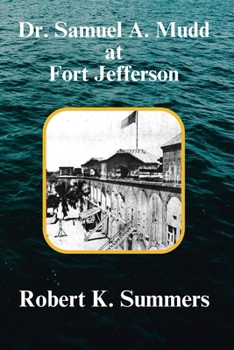Dr. Samuel Mudd at Fort Jefferson
This is the story of Dr. Samuel A. Mudd's imprisonment at the Fort Jefferson military prison after being found guilty at the 1865 Lincoln assassination trial. It's the story of the punishment and redemption of a man who had lost everything -- his home, family, children, reputation, and freedom -- only to recover everything by risking his life, and almost losing it, to save the lives of those who imprisoned him.
In 1867 there was a terrible yellow fever epidemic at Fort Jefferson. Three hundred thirteen soldiers, 54 prisoners, and 20 civilians, a total of 387 people, were at the fort. Two hundred seventy of them contracted yellow fever. When the fort's doctor died, the fort's commander asked Dr. Mudd to help, and he agreed. When the epidemic had finally run its course, the surviving soldiers at Fort Jefferson signed a petition asking President Andrew Johnson to pardon Dr. Mudd for his heroic work during the epidemic. The petition said in part: He inspired the hopeless with courage, and by his constant presence in the midst of danger and infection, regardless of his own life, tranquilized the fearful and desponding. President Johnson pardoned Dr. Mudd on March 8, 1869, in large part because of his heroic work during the epidemic. After his release from prison, Dr. Mudd returned home to his wife and children, redeemed in the eyes of many for his life-saving work at Fort Jefferson. He lived 14 more years, dying from pneumonia in 1883 at the age of 49.Format:Paperback
Language:English
ISBN:B08HTBWT19
ISBN13:9798684908781
Release Date:September 2020
Publisher:Independently Published
Length:168 Pages
Weight:0.51 lbs.
Dimensions:0.4" x 6.0" x 9.0"
Customer Reviews
0 rating





